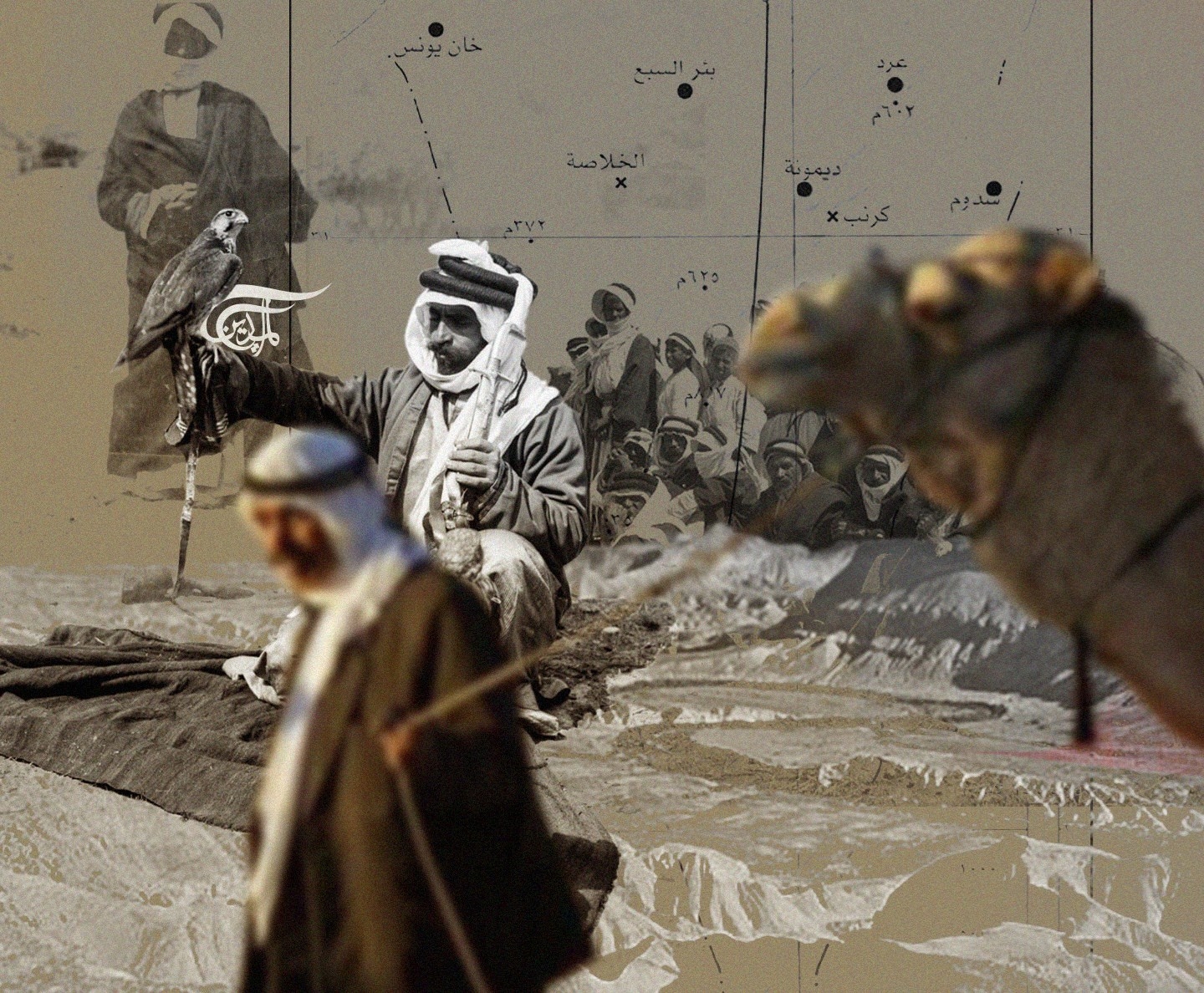Al-Naqab and Diyar Bir Al-Sab’…The social composition and the people
Although the Israeli occupation displaced a large portion of the people of Diyar Bir Al-Sab’ (al-Naqab) in 1948, these lands are still attributed to their owners, some of whom are descendants of tribes originating from the Arabian and Sinai peninsulas.
-

Some of Al-Naqab's Bedouins are descendants from Bedouin tribes in the Arabian Peninsula.
Diyar Bi’r Al-Sab’, otherwise known as the desert of Al-Naqab, comprises almost half the historical area of the land of Palestine, meaning close to 12,577,000 dunums (1 dunum ~ 1,000 square meters).
Although it’s called a desert, it actually isn’t one; yet, it is a mix of very fertile agricultural land, dry rocky mountainous lands, and sandy lands, and all of them have large amounts of groundwater, according to studies performed by Arab experts in the field, not to mention sizeable mineral riches found in the region.
This large area has been inhabited by Bedouins for hundreds of years, during which they owned title deeds that were written with legible legal wording since the days of the Ottoman Empire. The British mandate also issued them specific deeds that asserted their ownership of the lands. These vast lands are still attributed to their owners, those currently living there, or those displaced, as the Israeli occupation forcibly displaced a large number of them in the Nakba of 1948.
It also worked during the 1950s to forcibly displace a large number of the rest and concentrate them in an area called Al-Siyaj (the fence), robbing them of a large portion of their lands, which it later turned to a closed militarized zone, despite people still living there. The Bedouins were thus left with only 2% of their lands; still, Israeli occupation authorities try today to confiscate what little they have left, and forcibly remove them to ghettos that lack even the basic elements of a normal life.
Bedouin society: A sacred outlook on land
Al-Naqab’s Bedouins are former nomads that used to travel with their cattle according to the seasons from one area to another, each within the recognized boundaries of their lands, as Bedouin tribes have always respected others’ lands, which for them was something they held very sacred, like one’s honor. Later on, they became semi-nomads that lived on raising cattle and agriculture in unrecognized villages, while those who were forcibly concentrated in sedentary towns developed a more comfortable lifestyle, much like that of towns and cities. Still, people still raise cattle in these towns under very restricted conditions.
The Bedouin society is a traditional and conservative society. Some of Al-Naqab’s Bedouin tribes are descended from the Arabian peninsula’s bedouin tribes, and some from the Sinai peninsula’s. In Al-Naqab, a clan is a specific social unit, and the tribe is a grouping of clans that existed in Palestine before 1948, a small number of which remained after the Nakba. In Al-Naqab, clans are split into Rub’, the Rub’ into big families (Hama’el), and each big family split into smaller families.
Al-Naqab historian Dr. Mansour Al-Nasasirah says in his book Badw Al-Naqab wa Bir Al-Sab’ (The Bedouins of Al-Naqab and Bir Al-Sab’: 100 Years of Politics and Resistance) that out of 95 clans that existed in the south of Palestine during the British mandate, only 19 remained in Al-Naqab and Bir Al-Sab’ after the Nakba. These 19 were forcibly gathered after 1948 and taken directly to the Al-Siyaj area northeast of Bir Al-Sab’ until 1967.
It should be said that the number 19 here goes back to the Israeli concept of the remains of the clans that were recognized, despite there being a much larger number of clans, but the idea was to group the ones that were left under these 19 in order to better control them after 1948. These were the clan leaders that Ben-Gurion’s government 'acknowledged'.
Al-Nasasirah also clarifies that the policies that were applied against Al-Naqab’s Bedouins in the 1950s, after they were grouped in Al-Siyaj, included the separation of clans while keeping peaceful clans intact, forcefully ejecting clans that remained in the western and northern regions of Al-Naqab to Al-Siyaj, appointing new clan leaders, confiscating their lands by passing new laws, robbing them of their historical ownership, and conducting censuses that aim to keep them under strict observation at all times.
A systemic attack on Al-Naqab's traditions
The people of Al-Naqab respect each other’s land ownership, even if they’re not registered on paper, and they are arbitrated in accordance with the binding Bedouin traditions and rulings in these matters. Land, just as one’s family, is considered something that cannot be assaulted or taken for granted. These traditions were, however, not listed in the rules of the occupation, especially in this period of time. Al-Naqab was a very neglected region for them, until the first Israeli Prime Minister, David Ben-Gurion drew attention to it and built his residence there, as he famously said “we wish to protect the desert in Al-Naqab, to protect the vacuum.”
Lastly, censuses show that the population of Al-Naqab is about 380,000, half of whom live in sedentary villages and the other half still steadfast in their villages - which the Israeli occupation authorities do not acknowledge - under living conditions that can be said at best to be unsuitable for human life and the modern way of living in the third millennium. They live in these villages without any infrastructure, water, electricity, schools, or infirmaries, in houses that are all made of tin that can neither protect them from the heat of summer nor from the cold of winter.

 5 Min Read
5 Min Read










